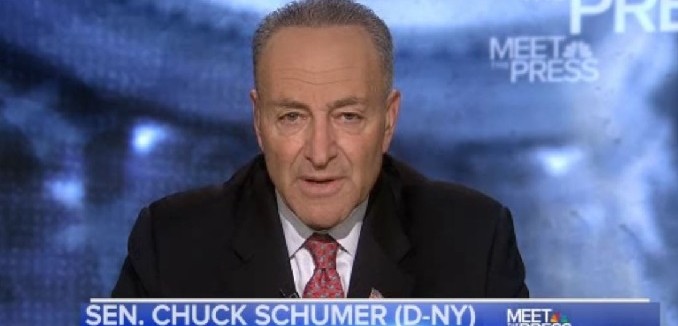The Hill reported mid-Sunday that leading Senate Democrats are doubling down on a bipartisan push to impose sanctions on Iran should the Islamic republic either cheat on the terms of the Joint Plan of Action during an upcoming six-month negotiating period or, at the end of that period, refuse to verifiably put its nuclear program beyond use for weaponization.
A bipartisan group of 26 senators last week unveiled the legislation, which provides the president the flexibility to put off the sanctions for a year as negotiations progress. Responding to explicit accusations that the sitting U.S. senators were trying to drag America into war, Sen. Chuck Schumer (D-NY) noted:
“There are many of us, Democrats and Republicans in this Senate, who believe the best way to avoid war and get Iran to give up nuclear weapons is by ratcheting up sanctions, not by reducing them,” Schumer said on NBC’s “Meet the Press.”
The outspoken New York senator chided the idea that Iranians came “to the table out of the goodness of their heart.”
Schumer went on to gesture toward a long-simmering controversy regarding tensions in the Obama administration’s position on Iran sanctions: The White House insists that while past sanctions successfully coerced the Iranians into negotiating against their will, future sanctions will derail negotiations by draining good will.
The Wall Street Journal this weekend also commented on the tension, noting that “Mr. Obama keeps saying that previous sanctions… are what brought Iran to the bargaining table”:
The current bill written by New Jersey Democrat Robert Menendez and Illinois Republican Mark Kirk simply warns Iran’s rulers of worse sanctions if they walk away. The bill would tee up tighter restrictions on Iran’s petroleum industry, access to foreign bank holdings and investment in engineering, mining and construction. This sharpens the incentive for Iran to dismantle its illegal nuclear facilities.
The Journal noted that “the bill would do nothing to undermine the talks unless Iran isn’t serious” and flatly evaluated that, by threatening to veto the legislation as a threat to negotiations, “the President is siding with Iran against a bipartisan majority in the US Congress.”
[Photo: NBCNews.com]




